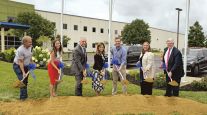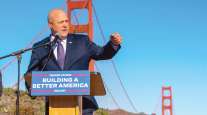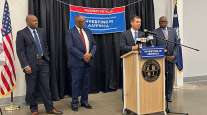Editorial: Turning Words Into Dollars
Well, at least we’re getting lip service related to fixing the nation’s ailing and neglected infrastructure network. Now, if we can just get some concrete action.
President Obama got the ball rolling during his State of the Union address to a joint session of Congress on Feb. 12, when he proposed a new program to rebuild the large number of bridges around the nation that are crumbling.
“Tonight, I propose a Fix-It-First program to put people to work as soon as possible on our most urgent repairs, like the nearly 70,000 structurally deficient bridges across the country,” Obama said. “We’ll put more Americans to work repairing crumbling roads and bridges.”
There were no details in his speech, but it was a hopeful sign that it made it into the prime-time speech.
The next day, the new chairman of the House Transportation and Infrastructure Committee, Rep. Bill Shuster (R-Pa.), rang the bell for a strong federal role in overseeing road building and related infrastructure improvements.
“An efficient national transportation network allows business to lower costs and enhances our productivity and profits,” Shuster said at the first committee session under his leadership.
These developments led American Trucking Associations to say, “We look forward to working with [Obama] and his administration to find the resources to address these issues within a reformed surface transportation program.”
Shuster has indicated that the time is near for starting work on the next highway bill, which is sure to become a marathon slog through Congress, based on recent history.
Meanwhile, the U.S. Chamber of Commerce that same day restated its support for raising federal fuel taxes, as ATA has proposed for several years, to fill the Highway Trust Fund coffers to pay for new roads and bridges and to repair existing ones.
“Improving our infrastructure will involve significant cost,” said the Chamber’s president, Tom Donohue, “but if we don’t act, the cost is going to be even higher and more difficult to meet.”
Donohue spoke at a Chamber-run conference on transportation issues.
It is certainly a hopeful sign that the word “infrastructure” is popping up in more and more headlines after coming from the mouths of national leaders such as these.
What would be even better, however, is a bipartisan agreement on how to provide the money necessary to make the nation’s urgent infrastructure needs get built.




